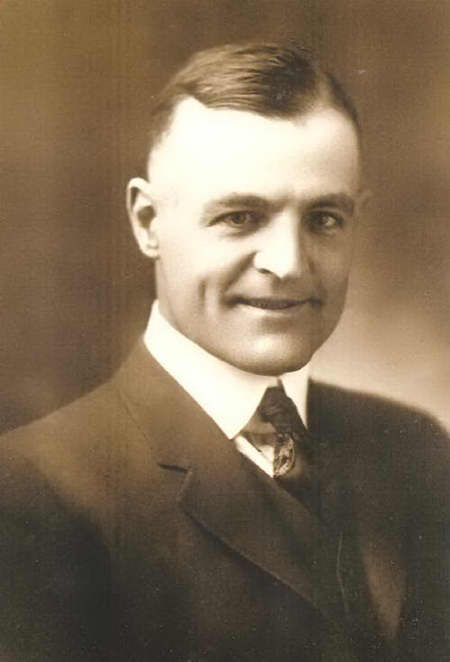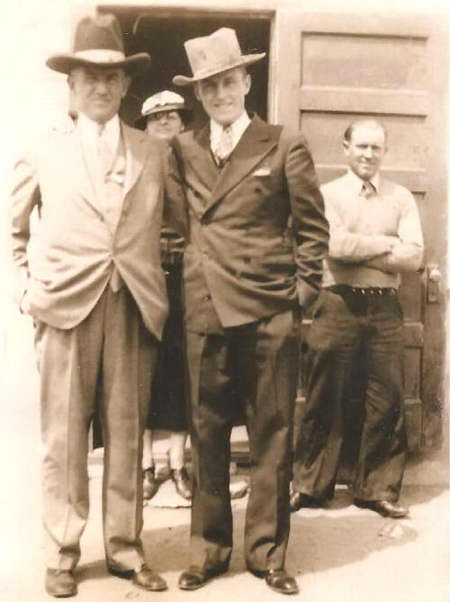Pipkin Family Association
Charles Wilton Pipkin |


 (The following is taken almost entirely from the many newspaper accounts that appeared about my great-uncle Charley in the Omaha and Lincoln newspapers in Nebraska, and the Reno and Las Vegas newspapers in Nevada. Sarah Pipkin Shook) Charles Wilton Pipkin was the oldest son of James Wilton Pipkin (1854-1927) and Laura Garner Pipkin (1857-1927). He was descended from John Pipkin of the 1745 Will through his youngest son, Philip (c. 1738-c. 1790), Col. Philip Pipkin (1770-1841), and Judge Philip Pipkin, Jr. (1814-1883). He was born in Farmington, Missouri where his father was practicing law and running a boarding house, and he was, without a doubt, the most successful of Jamesí and Lauraís children. He was gregarious, adventuresome, hard-working, inventive, fearless, firm in his convictions, an organizer and entrepreneur. At the age of fifteen, Charley left home to go to Nevada where he was a mule-skinner in Goldfield from 1902 to 1905, after which he returned to the mid-west, first going to Lincoln, Nebraska, where he met and married Margaret Camerer on May 20, 1909. There he worked at various jobs, including unloading cars of ice and delivering milk. Around 1910 he moved to Omaha where he took a job as conductor on the street railway. On August 20 of that year Margaret gave birth to a girl, Charlotte June. She would be their only child. Margaret was not happy with any of the jobs he took and after a short stint of working in a mental hospital, he took a job as a motorcycle policeman. From 1911 through 1916, he worked the streets of Omaha. As a policeman, Charles displayed a special ability for "detecting." This was especially seen as he began to discover and break up large gangs of auto thieves. Apparently automobiles were easy to steal and resell, and it became almost epidemic to do so. He was so successful that a new job title was created for him -- "Automobile Detective." One of his first acts in this job was to organize more than 1,000 automobile dealers and garage men within a radius of 250 miles of Omaha, for the purpose of catching automobile thieves. Charlesí success as an "automobile detective" was so remarkable that he began to receive flattering offers from automobile insurance men. In 1917 he quit his police job and accepted one of the offers, opening up an office in Omaha. He would soon be associated with the Omaha Detective Association, working both as a detective and an auto insurance adjustor. His work with the Omaha Detective Association didnít last long, for he had barely begun to work with them when a huge scandal involving that organization and the Omaha Police force erupted. He was actually included in the indictments issued, but after a lengthy investigation and trial, he was exonerated. Wanting to distance himself from the scandals and the people involved, he resigned from that organization. Sometime between 1917 and 1920, Charles formed the "Pipkinís National Detective Agency." On October 7, 1920, an article entitled, Pipkin AGENCY GROWING RAPIDLY, appeared in the Omaha World Herald. The article stated that he was now employing over 50 men, with offices in Omaha and Lincoln. Branch offices in Sioux City, Des Moines, Kansas City and Denver were being considered. "It is believed that this agency will eventually become one of the largest in the United States," the article went on to say. The success of his business not withstanding, serious trouble was on the horizon. On November 15, 1921 an ad for an auction of "furniture from the Pipkin home" appeared in the Omaha paper. On December 2, 1921 the Lincoln State Journal contained the headline -- CANNOT FIND CHARLES Pipkin. The subtitle read - "Weeks search fails to disclose whereabouts of Detective." He eventually turned up in Nevada, working as a guard at the Nevada State Hospital. On December 8, 1923 he obtained a divorce from Margaret. In his divorce proceedings he told the judge that his wife had "forced him out of the (insurance) business, and that, "although he was afraid of one woman, he didnít hesitate in taking a position as guard at a hospital for mental diseases, where at any time he might have to battle with a maniac." On February 9, 1924, he married Roxie Renner at the home of a cousin in Los Angeles, California. According to the 1920 Census, Roxie Renner was a secretary for a corporation lawyer in Lincoln, Nebraska. It is logical to assume that Charles had met her there through the Lincoln offices of his detective agency. His relationship with her may have been part of why Margaret became so threatening, and why he removed himself from Nebraska to Nevada until he received his divorce. In 1925 Charles and Roxie moved to Chicago, Illinois where Charles worked as an executive for a bus service. While in Chicago, two daughters were born to Charles and Roxie -- Roxie Anne in 1929 and Sallie Lou, one or two years later. In 1937, the family moved back to southern Nevada for Roxieís health. There Charles went back into the insurance business, working for the International Life Underwriters. By 1941 Charles had also become a licensed real estate broker and salesman in Las Vegas. In 1947 Charles and Roxie, along with another partner formed a publishing concern, known as the House Warven, Inc., with a capital stock Listing of $299,000. This enterprise would become an important part of Charlesí other main interest--politics. Charles always had been involved in civic affairs. In Omaha he had run for office as an assemblyman for the city. In Las Vegas he also was active, running for a two-year term on the Clark County Hospital Board in 1940. In 1942 he lost in a close primary race for the democratic nomination for State Assemblyman. In June of 1944 he ran in the county elections for Justice of the Peace. Along with the announcement of his candidacy, this item was added: "It is reported that he would soon resume publication of the Pittman Key, a weekly newspaper devoted to politics. Charles was a life-long democrat, as were all his ancestors and all of his siblings. He was a conservative, however. Today he would have been labeled a "blue dog Democrat." By 1949 Charlesí involvement in civic and political affairs reached its summit. He had formed and been the head of the Las Vegas Taxpayers Association since 1943 and it now had about 650 members. The organization was formed as a "watch-dog" group to insure honesty and fiscal responsibility in city and state government. It was sort of the "Tea Party" of his day. In August 1949 Charles "wired a protest to the governor against granting a $120,000 emergency loan to the city of Las Vegas. In his wire he charged that "an emergency does not exist at the present time which cannot be corrected by curtailment of unnecessary expense brought about by poor management, waste and an overloaded payroll." He further stated "that the city can solve its own financial difficulties if our commissioners are given to understand that the state refuses to continue to play Santa Claus as long as our city business is conducted in a loose and unbusinesslike manner." In January 1950 the Tax Payers Association made a request to the Governor that a certain William Moore of Las Vegas be removed from the State Tax Commission because of his close connection with gambling. "The Las Vegas Tax Payers Association, after careful analysis of the deplorable conditions existing in the gambling industry locally, deem it necessary to replace William Moore as a member of the Nevada tax commission with one not identified with gambling," he wrote. The governor took the request to the Nevada Tax Commission, where it was immediately and unanimously rejected, and Moore was praised for his work. On February 15, 1950, frustrated with the governorís lack of interest in the taxpayers concerns, Charles announced that he would run in the democratic primaries for Governor. "I am seeking the governorship because I donít approve of gamblers holding public office either appointive or elective and because I donít like the present governorís inability to take a stand on issues. . . . I donít like the way things have been going in Nevada for a long time. I believe gamblers should stay out of politics for their own good, for the protection of the industry," he stated. As the primary campaign progressed, polls started to suggest that Governor Pittmanís support was failing. Believing that the candidates most likely to win were willing to support his own ideas, he withdrew from the race and threw his support to the man he believed to be the best candidate. In 2005, Las Vegas: A Centennial History, written by Eugene Moehring and Michael S. Green was published by the University of Nevada. In their recounting of the history of Las Vegas during the 1940ís and 1950ís, they made the following statements: "The Taxpayerís Association, lead by Charles Pipkin, also did battle with the Mayor of Las Vegas. They battled the favoritism that allowed paving streets only in areas where the streets would increase the value of property owned by influential citizens. They fought for the rights of Strip owners to do business in a casino not run by the mob. They fought against racism that tried to move black businesses out of downtown and into the all-black neighborhoods of the West-side. They fought against such "socialist" policies as trying to take the cityís electric utility away from Southern Nevada Power and the airport away from Western Air Express to make them public institutions." "Men like Pipkin were necessary in a town where some business leaders used elective office not only to guide the city, but also to benefit their own interests. Pipkin and his conservative allies were part of the informal check-and-balances mechanism that kept city government responsive to the public--a mechanism still vital today when growth, taxation, and spending are more controversial than ever." Had Charles been elected as Governor of Nevada, he would not have lasted much more than a year into his term of office. In February or March 1952 he contracted pneumonia, which aggravated a heart condition with which he had suffered for many years. After weeks in bed, he died at his home on May 22, 1952. He was a member of the Catholic church and had been active in the Knights of Columbus in Las Vegas. Both of his daughters had studied at Immaculate Heart College in Los Angeles. His funeral took place at St. Bridgetís Church in Las Vegas. Roxie survived him by 33 years, dying at Pueblo, Colorado, on December 15, 1986. She never remarried. |
